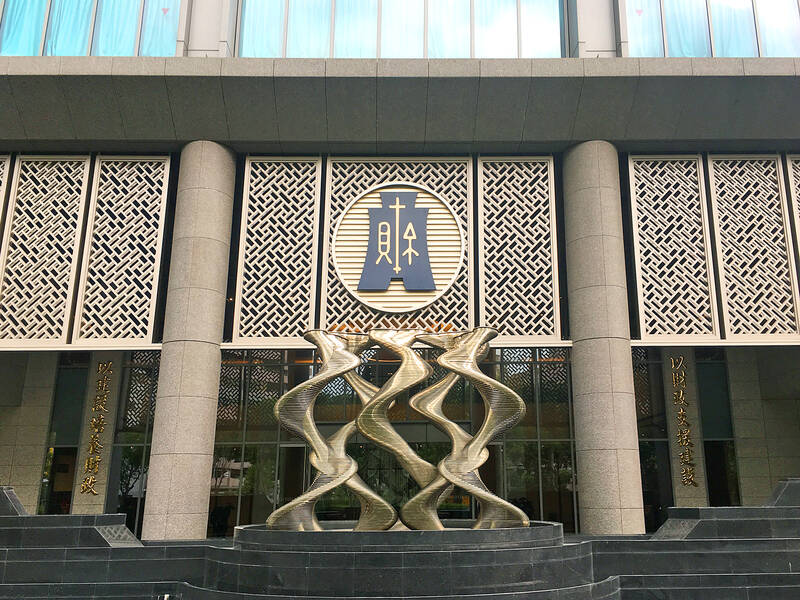Tax revenue last month expanded 20.9 percent year-on-year to NT$365.3 billion (US$11.47 billion), driven mainly by a spike in corporate income taxes that offset declines in securities and property transaction taxes, the Ministry of Finance said yesterday.
Corporate income tax revenue swelled 55 percent to NT$163.4 billion last month, as companies generally reported an improvement in business, although the nation’s exports faltered, the ministry said.
In the first nine months of the year, corporate income tax revenue surged 57 percent to NT$893.8 billion, as listed companies posted a 12.83 percent annual gain in combined revenues.

Photo: Clare Cheng, Taipei Times
The robust corporate income tax revenue would give the national treasury a tax surplus of about NT$300 billion this year, although revenue generated from securities, property and sales taxes appears bound to lag behind targets, Department of Statistics Deputy Director-General Chen Yu-feng (陳玉豐) said.
Personal income tax revenue would also lend support, with revenue in the first three quarters of the year rising 29 percent to NT$562.9 billion, after gaining 1.8 percent last month alone to NT$44.2 billion, the ministry said.
Chen attributed the advance in personal income tax revenue to the extension of capital gains taxes to transfers of presale housing contracts.
Sales tax revenue slumped 16.3 percent to NT$12.2 billion after the government stretched tariff reductions on imported oil, gas and diesel to slow inflation, Chen said.
Securities transaction tax revenue last month tumbled 29.1 percent to NT$12.6 billion, while land value increment tax revenue fell 15.6 percent to NT$6 billion, as weak sentiment drove people to the sidelines, the ministry said.
As of last month, overall tax revenue grew 17.3 percent to NT$2.62 trillion, fulfilling 96.4 percent of the budget planned for this year, the ministry said, adding that the next three months would bring in generous tax surpluses for the state coffers.
Trade groups have pressed for tax refunds to help stimulate consumer spending, as exports could head south amid a global slowdown.

Zhang Yazhou was sitting in the passenger seat of her Tesla Model 3 when she said she heard her father’s panicked voice: The brakes do not work. Approaching a red light, her father swerved around two cars before plowing into a sport utility vehicle and a sedan, and crashing into a large concrete barrier. Stunned, Zhang gazed at the deflating airbag in front of her. She could never have imagined what was to come: Tesla Inc sued her for defamation for complaining publicly about the vehicles brakes — and won. A Chinese court ordered Zhang to pay more than US$23,000 in

Taiwan Semiconductor Manufacturing Co (TSMC, 台積電) yesterday said that its investment plan in Arizona is going according to schedule, following a local media report claiming that the company is planning to break ground on its third wafer fab in the US in June. In a statement, TSMC said it does not comment on market speculation, but that its investments in Arizona are proceeding well. TSMC is investing more than US$65 billion in Arizona to build three advanced wafer fabs. The first one has started production using the 4-nanometer (nm) process, while the second one would start mass production using the

‘NO DISRUPTION’: A US trade association said that it was ready to work with the US administration to streamline the program’s requirements and achieve shared goals The White House is seeking to renegotiate US CHIPS and Science Act awards and has signaled delays to some upcoming semiconductor disbursements, two sources familiar with the matter told reporters. The people, along with a third source, said that the new US administration is reviewing the projects awarded under the 2022 law, meant to boost US domestic semiconductor output with US$39 billion in subsidies. Washington plans to renegotiate some of the deals after assessing and changing current requirements, the sources said. The extent of the possible changes and how they would affect agreements already finalized was not immediately clear. It was not known

A TAIWAN DEAL: TSMC is in early talks to fully operate Intel’s US semiconductor factories in a deal first raised by Trump officials, but Intel’s interest is uncertain Broadcom Inc has had informal talks with its advisers about making a bid for Intel Corp’s chip-design and marketing business, the Wall Street Journal reported, citing people familiar with the matter. Nothing has been submitted to Intel and Broadcom could decide not to pursue a deal, according to the Journal. Bloomberg News earlier reported that Taiwan Semiconductor Manufacturing Co (TSMC, 台積電) is in early talks for a controlling stake in Intel’s factories at the request of officials at US President Donald Trump’s administration, as the president looks to boost US manufacturing and maintain the country’s leadership in critical technologies. Trump officials raised the